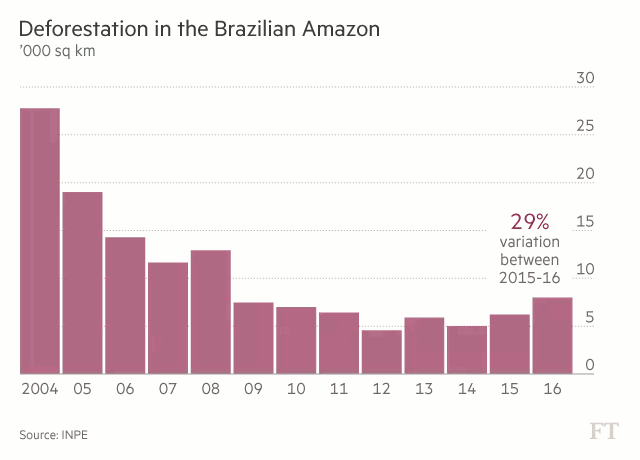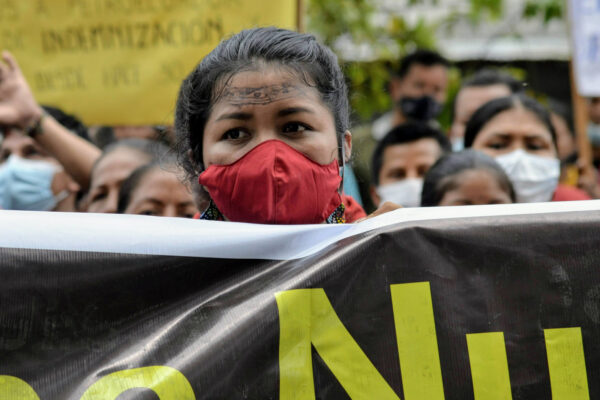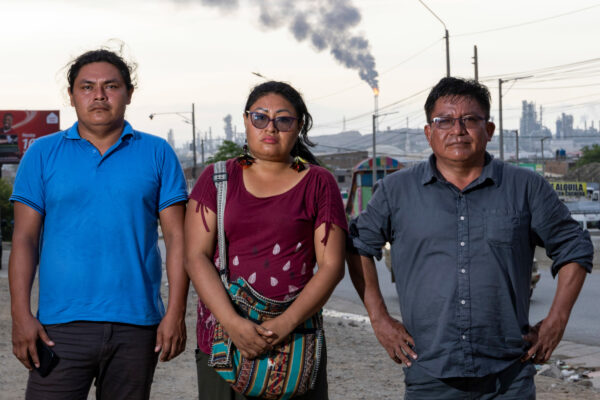President Michel Temer must choose whether or not to sign a bill freeing up a large section of the Amazon to agriculture, as Brazilian activists warn that the country’s environmental commitments could be sacrificed to demands fuelled by its political crisis.
Mr Temer, who backs the Paris climate agreement, has until the end of the month to sign or veto a bill approved by the Senate last month which allows land to be cultivated by redrawing the borders of the Amazon’s Jamanxim national forest and park and the Atlantic forest of the São Joaquim national park.
Pressure has been mounting on Mr Temer since a scandal broke last month in which the former chairman of JBS, the world’s largest meatpacker, secretly taped him allegedly discussing bribes. Support from lawmakers of the powerful ruralista bloc, the large farmers’ group with 200-plus seats in Congress, may prove key to his political survival in the face of growing calls for his resignation or impeachment.
On Friday, Brazil’s electoral court voted against a motion that could have ousted the president. Now, signing a bill to remove protected area status for almost 600,000 hectares of land may boost Mr Temer’s support in congress, said Marcio Astrini, public policy head of Greenpeace Brazil.
“In an attempt to save himself, Temer will strengthen the ruralista group and [this will] lead to even more destruction for the Amazon,” he said. “The political crisis is opening up a big space for the ruralistas to take advantage of the situation — of the fragility of the president, to pass projects they have never managed to pass.”
Brazil is home to the largest part of the Amazon. Last year, the National Institute for Space Research reported a 29 per cent increase in deforestation. The Amazon Environmental Research Institute estimates the changes to Jamanxim alone could lead to 280,000 hectares of rainforest being destroyed by 2030, releasing 140 million tons of carbon dioxide.

Mr Temer has ratified the Paris climate accord, pledging to cut emissions by 43 per cent by 2030 from 2005 levels. The Brazilian government has said it “received with profound concern and disappointment” US President Donald Trump’s decision to withdraw the US from the Paris treaty.
Mr Temer recently told foreign journalists he had yet to examine the Amazon measures, so had not decided whether to exercise a presidential veto. But his government’s support for the Paris accord showed “our tendency is to protect the environment”.
Brazil has been suffering its worst recession on record. It is one of the world’s top producers of sugar and soya, and this month reported its first quarter-on-quarter growth after eight quarters of contraction helped by a bumper soy crop.
Urging Mr Temer not to sign the bill, the Brazilian Coalition on Climate Forests and Agriculture, an alliance of business and environmental groups, said the measures threatened to “damage the image of the country and its agribusiness”.
Mr Temer said last week that there was no room “for growth without sustainability”. Covatti Filho, a ruralista lawmaker, said his bloc was “strengthening agriculture, which is making its contribution. In spite of facing strong resistance from environmentalists we are moving forward with regulatory changes that are essential for agriculture.”
Ricardo Trípoli, an environmentalist lawmaker with the PSDB party, part of Mr Temer’s coalition in congress, called the measures “horrible”. “I warned the ruralistas: if you cut the forests today you won’t have water for your lands tomorrow.”













